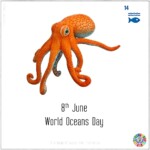This year’s International Zero Waste Day focuses on fashion and textiles. The earth is a victim of fashion. Thousands of chemicals are often used in the production of textiles, many... Read more
World Ocean Day
World Ocean Day, celebrated annually on June 8, is a global event that emphasizes the critical role oceans play in the health of the planet and human well-being. Its importance is multi-faceted, addressing environmental, economic, social, and cultural aspects. The day serves as a reminder of the vital need to protect and sustainably manage the world’s oceans.
Importance of World Ocean Day
- Raising Awareness: World Ocean Day helps to increase public awareness about the significance of oceans and the various challenges they face, such as pollution, overfishing, and climate change. It encourages individuals, communities, and governments to take action to protect marine ecosystems.
- Promoting Conservation Efforts: The day promotes conservation initiatives and highlights successful projects and policies aimed at protecting marine biodiversity. It provides a platform for sharing knowledge and best practices.
- Encouraging Sustainable Practices: World Ocean Day advocates for sustainable fishing practices, reduction of plastic waste, and responsible coastal development. It aims to foster a sense of stewardship and responsibility towards the marine environment.
- Supporting Education and Research: The day supports educational programs and scientific research that contribute to a better understanding of marine ecosystems and the impacts of human activities. It also underscores the importance of incorporating ocean science into policy-making.
- Fostering Global Cooperation: World Ocean Day facilitates international cooperation on marine issues, bringing together governments, organizations, and individuals from around the world to work towards common goals.
Relation to the Sustainable Development Goals (SDGs)
World Ocean Day is closely aligned with several of the United Nations Sustainable Development Goals (SDGs), particularly SDG 14, which focuses on “Life Below Water.” This goal aims to conserve and sustainably use the oceans, seas, and marine resources. Key targets of SDG 14 include:
- Reducing Marine Pollution: Significantly reduce marine pollution of all kinds, particularly from land-based activities, including marine debris and nutrient pollution.
- Protecting Marine and Coastal Ecosystems: Sustainably manage and protect marine and coastal ecosystems to avoid significant adverse impacts, including by strengthening their resilience.
- Minimizing Ocean Acidification: Address the impacts of ocean acidification, which poses a threat to marine life and ecosystems.
- Sustainable Fishing: Effectively regulate harvesting and end overfishing, illegal, unreported, and unregulated (IUU) fishing, and destructive fishing practices. Implement science-based management plans to restore fish stocks in the shortest time feasible.
- Conserving Coastal and Marine Areas: Increase the coverage of marine protected areas, consistent with national and international law and based on the best available scientific information.
- Economic Benefits for Small Island Developing States and Least Developed Countries: Enhance the economic benefits to these regions from the sustainable use of marine resources, including through sustainable management of fisheries, aquaculture, and tourism.
Additionally, World Ocean Day supports other SDGs by:
- Promoting Climate Action (SDG 13): Highlighting the role of oceans in climate regulation and the need to address climate change impacts on marine environments.
- Ensuring Sustainable Consumption and Production (SDG 12): Encouraging reduction of marine pollution and promoting sustainable use of ocean resources.
- Improving Partnerships (SDG 17): Facilitating partnerships between countries, organizations, and sectors to achieve sustainable ocean management.
In conclusion, World Ocean Day is a crucial event that not only raises awareness about the importance of oceans but also aligns with and promotes the achievement of several SDGs, particularly those related to environmental sustainability, economic development, and global cooperation.














